

Departure preparation and direction PL/UA border
Preparations of cars and equipment are going to the finals. In the last week, before departure, a lot of things are being completed at the last minute on the cars and in the documentation. For various reasons, there was a delay in the process of modifying the cars, and meeting the departure date requires several drivers from the team almost every other day, in order to move one of the Humvees to another workshop, where either armoring or medical installation is done (here, a big thank you to the company ROYAX, s.r.o., for willingness and access!) or service and modification of cars. In addition to synchronizing the departure and all the needs, we also deal with the transfer of equipment and material for this event after work.
As part of the trip with the ambulances, we decided to synchronize the trip with the acquisition and delivery of an all-terrain vehicle for the ZSU explorers, who we have been supporting for a long time and who work on the Bachmut Front. At the same time, as part of the long-term support of the hospital in Kremenchuk (this project is again called "Fallen Angel"), which cares for the wounded defenders of Ukraine (mostly after severe injuries), we decided to bring them supplies of medical material and also rehabilitation aids for wounded soldiers.
To make matters worse, our monitoring team was also preparing the trip, so we were looking for a suitable car for them to operate in Eastern Ukraine and we also decided to combine the trip. We manage to synchronize everything with the strain of physical, but mainly psychological forces, and even on the day of departure, in the afternoon, we managed to obtain an export permit for the military Humvee to Ukraine. To those who were strongly involved in this (to make everything happen) we thank you VERY MUCH. We have the papers, the cars are ready, so hurry up and load them onto the semi-trailer and the first part of the team, together with the tractor, sets off in the direction of the Ukrainian-Polish border.
It is the evening of the first day of the trip and a few hours separate us from the departure of the rest of the group, all approx. 24 team members (except those who have already left with the trailer) say goodbye to their families, pack their last things and slowly move to our warehouse.
Gradually, everyone meets in the warehouse, and after a light welcome, the loading of medical supplies, medical devices, equipment for ZSU soldiers, tools and service items for Humvees, personal items and protective equipment into the vans is organized. For this, it is necessary to simultaneously fill out customs declarations for things that are a gift to Ukraine, so that we do not stay at the border when we arrive there. Everything is loaded relatively quickly (transportation capacity up to the ceiling again) and a short briefing follows before the team leaves. As part of the briefing, it is repeated to everyone who is the commander of the trip, who are his representatives, where are they going and why, what are the security measures and the approximate time schedule of the trip. It's 22:00 and we get into our vans and off-road vehicles towards Ukraine. Some 800 km and about 9 hours of driving await us at the PL/UA border.
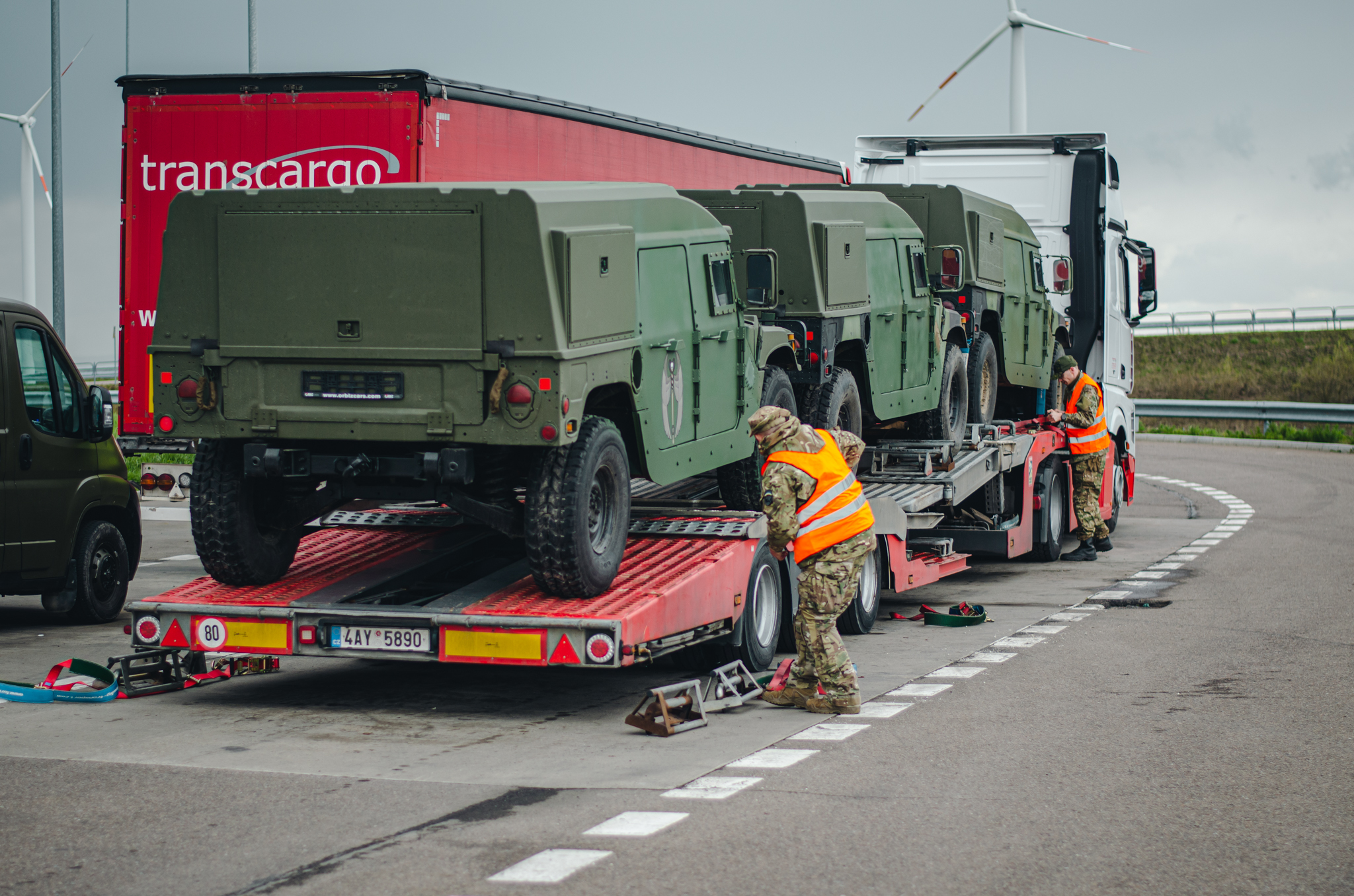
Arrival at the PL/UA border and unplanned stay at the hotel
During the night crossing through the Czech Republic 🇨🇿, we recruited the rest of the team members who are from other parts of our country. By agreement, Vojta (known as Záložka z Morava) and Marian from CESTA naděje života z.s. joined us. with his van, which was filled primarily with equipment for the military hospital in Kremenchuk. The kilometers passed and the drivers took turns behind the wheel so that we wouldn't waste precious time.
The convoy of vehicles without a tractor arrived at the rest stop at the border crossing, where it was agreed that we would be able to remove the Humvee from the trailer and drive towards the border crossing as a complete convoy. After a few hours, our truck arrived. As soon as the truck arrived, we unloaded the Humvee and prepared the crews for the vehicles. Everyone takes their seats, radios are handed out to vehicles and connections are checked. The final refinement of the positions of individual vehicles during the move is in progress. To be sure, we also sent a small delegation to the crossing to confirm the agreed so-called "Green Corridor" for the passage of our convoy.
Unfortunately, when checking the prepared documentation, which took up perhaps the entire file, we came across an unpleasant thing. Among all the documents, we were missing one Polish one, which is needed to cross the border with military material. On Friday, during the late afternoon, we unfortunately discovered that we were missing one document among the pile of permits and various documents. The Polish customs administration was strict and they forbade us to cross without a document, we probably don't need to say much about the disappointment that awaited the team mounted and ready in the cars after the delegation's return.
We had a good practice loading the Humvee onto the trailer and folding them down, so why not do it again just to be sure. So we loaded the cars back and went to Rzeszow, where the contact person for similar cases was the Polish administration for assistance to Ukraine. It looks like we'll have to get the document, but we can't apply for it until Monday, and tonight is Friday night. Fortunately, the Polish side came out to meet us and advised us both with accommodation in crowded Řešov and helped us secure a guarded parking lot for the trailer with the Humvee. Most of the team has limited time to leave and although there was a time reserve in the plan for various difficulties on the way, no one expected this problem for several days.
Again, it's time to reschedule the operation and find out the options. Finally it is decided, half of the team will go ahead with their cars and hand over the vehicle for the ZSU scouts and some of the medical supplies in Kyiv to our person who has set up a temporary Team 4 Ukraine base there. Competences are divided and the commander of the first half of the team is determined, who now heads forward independently. The other half of the team, who can extend the trip until the end of next week, remains in Řešov.
During the weekend, we wait, walk around the city, rest, and the group leader finds out possible solutions through acquaintances who are willing to solve work matters even on the weekend. On Monday, it turns out that, unfortunately, this document is not difficult to obtain in terms of requirements, but procedurally it takes a long time. We are already in contact with various institutions of the Czech Republic and we are solving how to solve this administrative barrier and get help to Ukraine as soon as possible. The days pass, the team rests or works on the cars. It's the 5th day of waiting for the hotel, we still have hotel costs (we gradually moved from the hotel to the construction hostel to save), the costs of waiting for the trailer driver and renting the trailer, and the vacations of the team members are also running short. The tension of how this will turn out is slowly building and different versions of backup plans are being worked on. In the end, together with our authorities, we managed to find an unconventional but feasible legal way to get the Humvee to Ukraine today. The plan is being put into motion and the team's mood is skyrocketing, it looks like we're really getting the operation done. It will only be so that the people from the team can return to work on Monday next week, but we'll do it! After an agreement with the Polish, Ukrainian and Czech parties, things are moving. The Humvees are assembled in one place near the border, together with three of our drivers, the rest of the team goes through the border on a standard route.
Meanwhile, the second team brought a car and aid for the field hospital to the temporary base of T4U in Kyiv 😉. As part of their own education, they stopped in Buče and Irpini to see with their own eyes the destruction left by the Russian occupation troops.
Darkness falls and our selected Humvee drivers get into their vehicles, they are not alone, there are dozens of other vehicles and equipment around them, which is headed as allied aid to Ukraine. Under the cover of night, behind the hum of high-volume Humvee engines and other techniques, our Humvees cross the border into Ukraine towards the fulfillment of the tasks we have set for Operation Humvee Ambulance…
We'll stop here to give a big thank you to those who helped us deal with an unusual situation. We are very pleased that just as we are looking for ways to help the attacked Ukraine, our institutions are also looking for ways to help. Many thanks to the Embassy of the Czech Republic in Kyiv together with the Ministry of Defense of the Czech Republic headed by Jana Černochová. We are very happy that as citizens of the Czech Republic 🇨🇿 we can rely on the help of our government institutions.
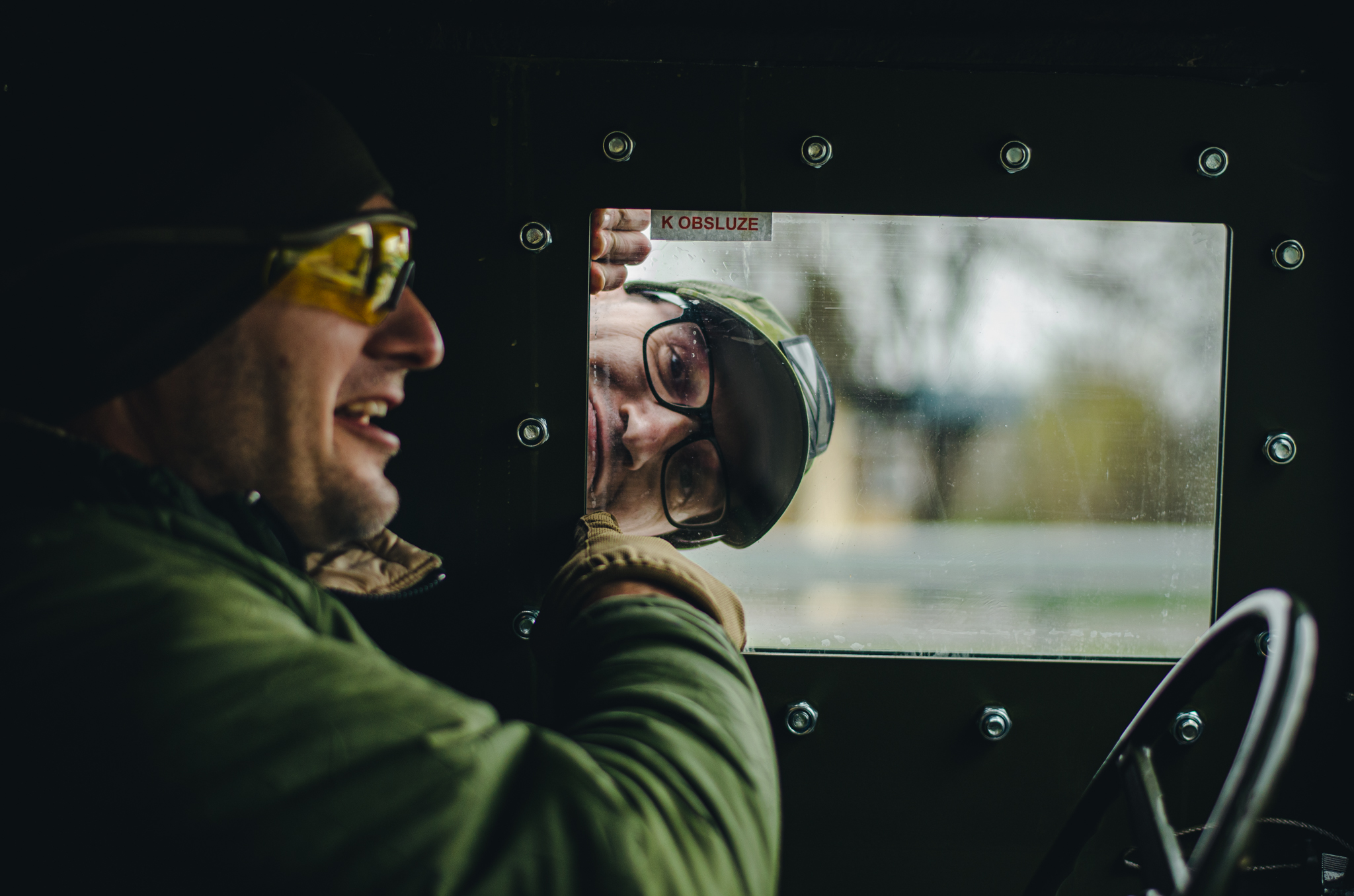
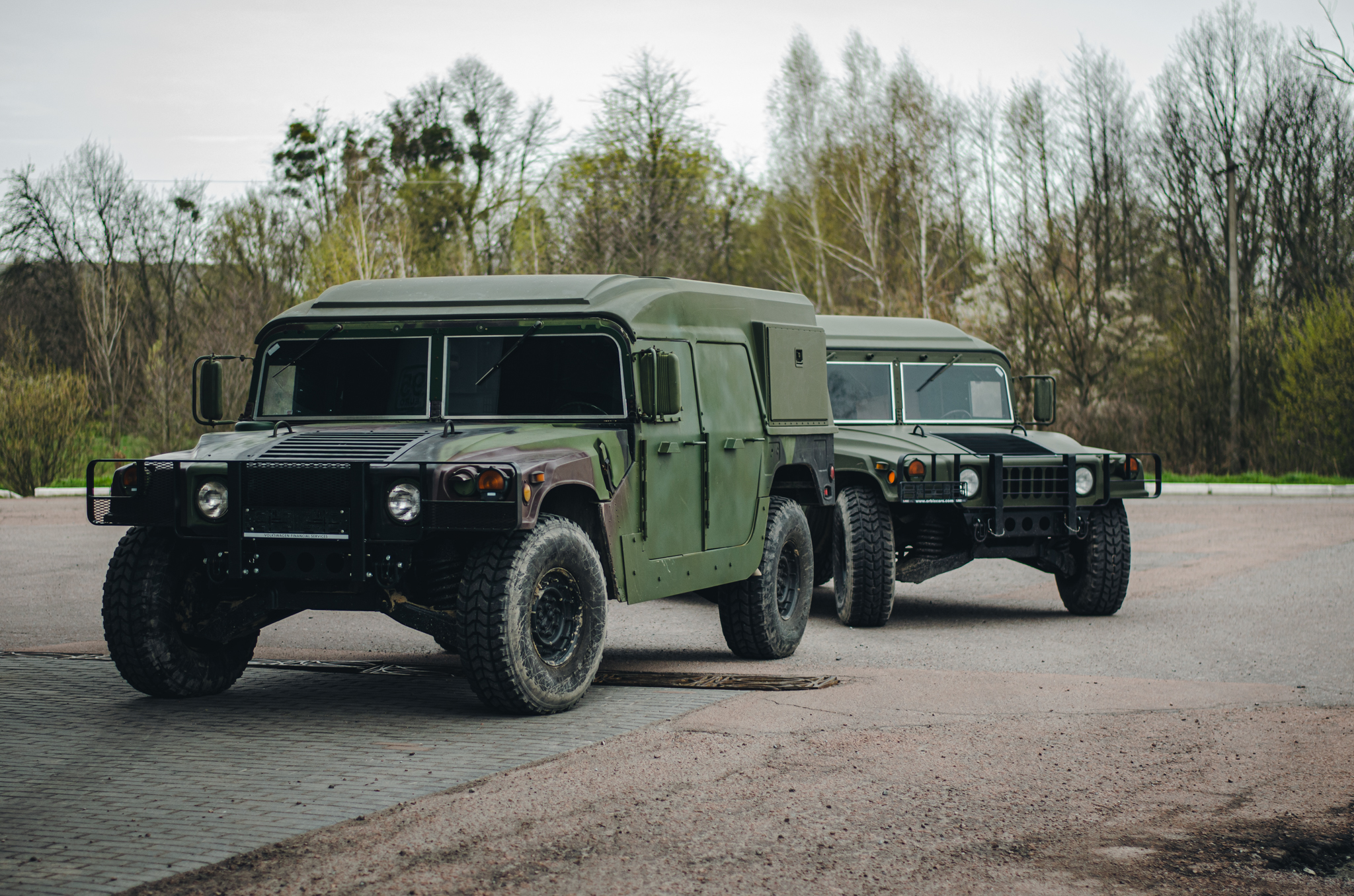
A long day
It is dark and a military convoy of allied aid to Ukraine is hurtling down the road through small villages towards Lviv, among Italian howitzers, Slovenian armored personnel carriers, military trucks and dozens of combat Humvees is a special group of vehicles. They are three armored Humvees with the Czech flag on the hood and driven by three volunteers from the Czech Republic. Already at the border, members of the ZSU came to see the group of these vehicles and thanked the drivers of the Czech Humvees for their help to Ukraine. Now the entire supply convoy is driving through the small streets of the villages outside Lviv under the flashing lights of the military police. The column stops near Lvov and three Czech Humvees are separated from the column, a clutch from the General Staff of the ZSU is waiting for them here, which was supposed to ensure the separation of vehicles from the column. After the Czech Humvees have been allocated, the convoy is immediately set in motion, it must not stay in one place for too long, foreign aid supply convoys are a very tempting target for air or missile attacks.
After separating the Humvees from the column, the Humvee drivers meet up with the rest of the group that followed the column in 3 vans to bursting with aid for Ukraine. There is a good mood in the group, we succeeded, we have a chance to meet the delivery of aid and the schedule! It is quickly determined where and which vehicles will go in our convoy and we set off in the direction of Kyiv. We don't have time to spare, so there are 2-3 drivers in each car. The system is that one driver is always driving, the other is sleeping and if there is a third, he is resting, but he is watching the driver what he is driving. Fortunately, we have free passage of the convoy at the checkpoints, so we do not experience any extra delays. Before lunch, the column arrives at the meeting place with our main contact from the General Staff of the ZSU. We find out that the location of the units for which the aid was directed has changed during our wait at the border. Drop-off locations and timetables need to be changed, but that's nothing we're not used to from the service. After a while, a new plan is "baked" and presented to the whole team. For part of the journey, the team has to split again in order to deliver aid to the troops in the time we have. The convoy with one Humvee and two accompanying vehicles is heading towards Kherson, the second group is heading with two Humvees, a T4U service vehicle and a ZSU escort to the hidden base of the paramedic unit about 20 km outside Kyiv.
The paramedic unit from Druzhkivka is undergoing rotation and part of the unit has now withdrawn to Kyiv for vehicles and replenishment, the other half is still in Druzhkivka and waiting to be replaced. In contrast, a company of marines, for which there is one Humvee and material aid, was transferred to the southern front. Before the group splits up, local television stops by to film a short report about our help. We don't chat for long, we're in a hurry. The groups went their separate ways, fortunately with the right of way, which comes in handy in traffic-filled Kyiv.
While the southern group slowly moves south, the eastern group rushes to quickly deliver vehicles and material aid to catch up with the southern group. The eastern group enters an area that, from a Czech point of view, we would rather call a cottage or a village around Prague. In what was originally an industrial area, there is a unit of paramedics who, when deployed at the front, go directly to the so-called 0 for the injured. We are greeted by the colonel, the commander of the unit, an older, smaller, but very pleasant gentleman. A part of the unit comes with him to see what we brought for them. The squad leader is taken by our chief engineer to the two front-line shot Humvees the squad has to see what can be repaired or used for spare parts. The commander is very interested, and maybe that's why our Hanz thought he was their unit's serviceman and not the commander. At the end of the interview, when Hanz asks how many such services the unit still has, the other members of the unit start laughing. The situation is explained and the commander takes it as a good joke, Hanz is a little embarrassed.
We give out the medical equipment and material that we brought in the Humvee to show the people from the unit what was brought in and how, if any, specific things are used. Some watch with interest, but others are as if they have received Christmas presents and at the same time have tears on their eyes. In particular, intraosseous drills, blood warmers and lung ventilators are very valuable to them, they say that this will save countless lives. We shake hands and hug, gratitude in its purest form is truly touching. One of the soldiers, Yuri, hands Sully a phone, saying someone wants to talk to him. It is Yuri's family, which is currently hiding from the war in Prague, and in Czech they thank us very much for the help and how we as a nation are trying to help the invaded Ukraine. She says she'll trust our armored Humvee to protect her husband when he goes to the front lines for the wounded.
Before departure, the unit commander organizes a joint photo of our team and part of their unit. After the photo is taken, everyone shakes hands once more, wishes good luck, and our service vehicle sets off to catch up with the southern group. It's a long way to go, but luckily Ukrainian petrol stations are available all over Ukraine, almost to the front, with a good selection of food, coffee and drinks. We say goodbye to our contact from GŠ ZSU, once again clarify the transfer plan and the contact windows for reporting the status. Then we set off towards Kherson through the slowly darkening landscape...
The southern column of Team 4 Ukraine is approaching the city of Uman, where there is an agreed meeting point with the UA unit of marines, for which there will be one Humvee and a lot of equipment. We had no idea that just a few days later this city would be the target of a bombing of a civilian settlement with more than 20 dead civilians. The Marines suggested meeting in that city because Mykolaiv, where the unit is stationed, would be too far for us to schedule. The second group with a service car catches up with the rest of the team just outside the city. We park together at the gas station where the meeting is to take place. We are unloading items from the vans that we want to donate to a company of Marines, in addition to the Humvee and medical equipment.
It doesn't take long for company commander Denys, an athletic thirty-something with a well-groomed beard, to arrive. From the point of view, a representative soldier. Together with his other two colleagues, we say hello, gradually the marines get to know the entire field team. We waste no time in showing them their new "faro" to save the lives of their brothers in arms. Denys knows English, so we don't have to deal with translation from our Bohdan, which speeds up the explanation. We show the equipment we put on the car and explain how it is used. The company commander's eyes are completely lit up, apart from the car, once again the intraosseous drills and needles give the greatest joy. It's a pleasant surprise that even though such a device is rare for paramedics, it seems that every unit has at least one medic or doctor who knows and knows how to use this device (so they can teach it to others when they get the device from us). We also give the boys a box of headlamps, a power bank and several fully equipped personal first aid kits called IFAKs.
We talk to Denys about his unit, it's not easy to listen to. They fought at the beginning of the war near Mariupol, then on other parts of the southern front, and now they are preparing for a counter-offensive. Their battalion suffered 70% losses during the fighting, so now the unit is mainly made up of newcomers who have replenished the losses from the previous months. The marines explain to us that cars like the one we brought to them are literally "a gift from God" and hope to save many lives. We promise longer-term support and cooperation with this company, Denys is really grateful for the support of the Czech public. Before saying goodbye, we take a photo together at the Humvee and receive a beautiful gift. The boys brought us a flag with the emblem of their unit, and some of them also signed a Ukrainian flag for us (these things will definitely go to a museum in the Czech Republic).
The Humvee and the marines leave for the southern front, and we get into our three vans in the direction of Dnipro, where we have the opportunity to spend the night with a friend of the gifted marines and also meet Czech Radio reporter Martin Dorazín. It is already quite late, but fortunately we have a permit for night crossings and everything is going smoothly at the blockposts. We arrive at the meeting place around 02:00 in the morning, it's a shabby industrial area. After a while of waiting, Lena actually arrives and guides us to the area. After parking the vehicles (driving around the city in the dark is quite challenging for orientation), we take sleeping bags and small backpacks from the cars and go deeper into the area. Lena takes us to the gym, and here we are in the boarding school building! We wouldn't really look here. Lena and her friends have prepared mattresses and blankets for us on the floor of the gym, so that for the first time since crossing the Polish border we will sleep like people. Everyone is exhausted and in no time the gym is gravely silent, only Sully and Rošťák are finalizing their plans for the next day, which we will spend in the frontline areas in the Donetsk region. The two headlamps above the map go out after a while and the last of the group goes to sleep.
This time, we were also accompanied by partners from CESTA naděje života z.s.
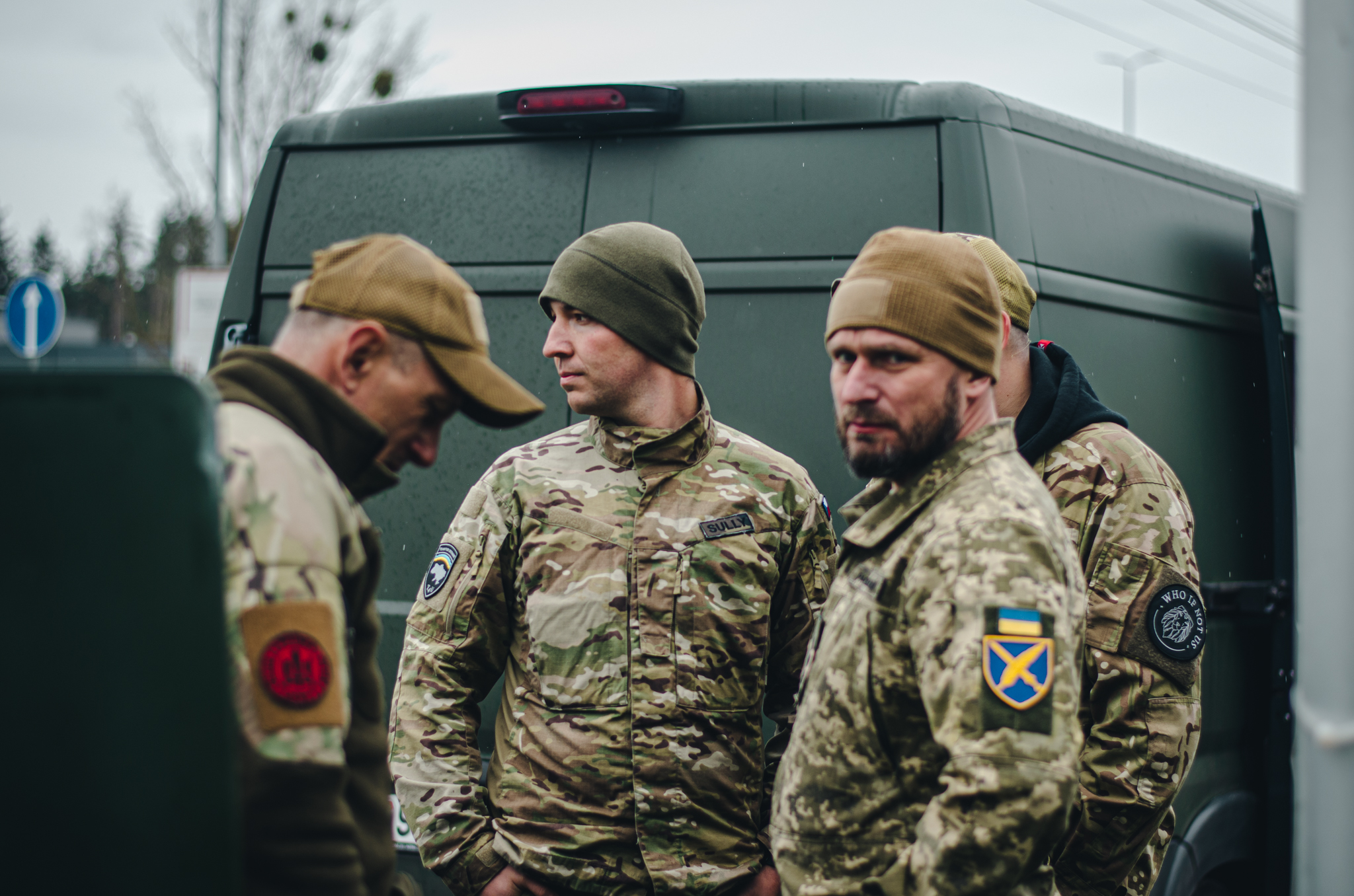
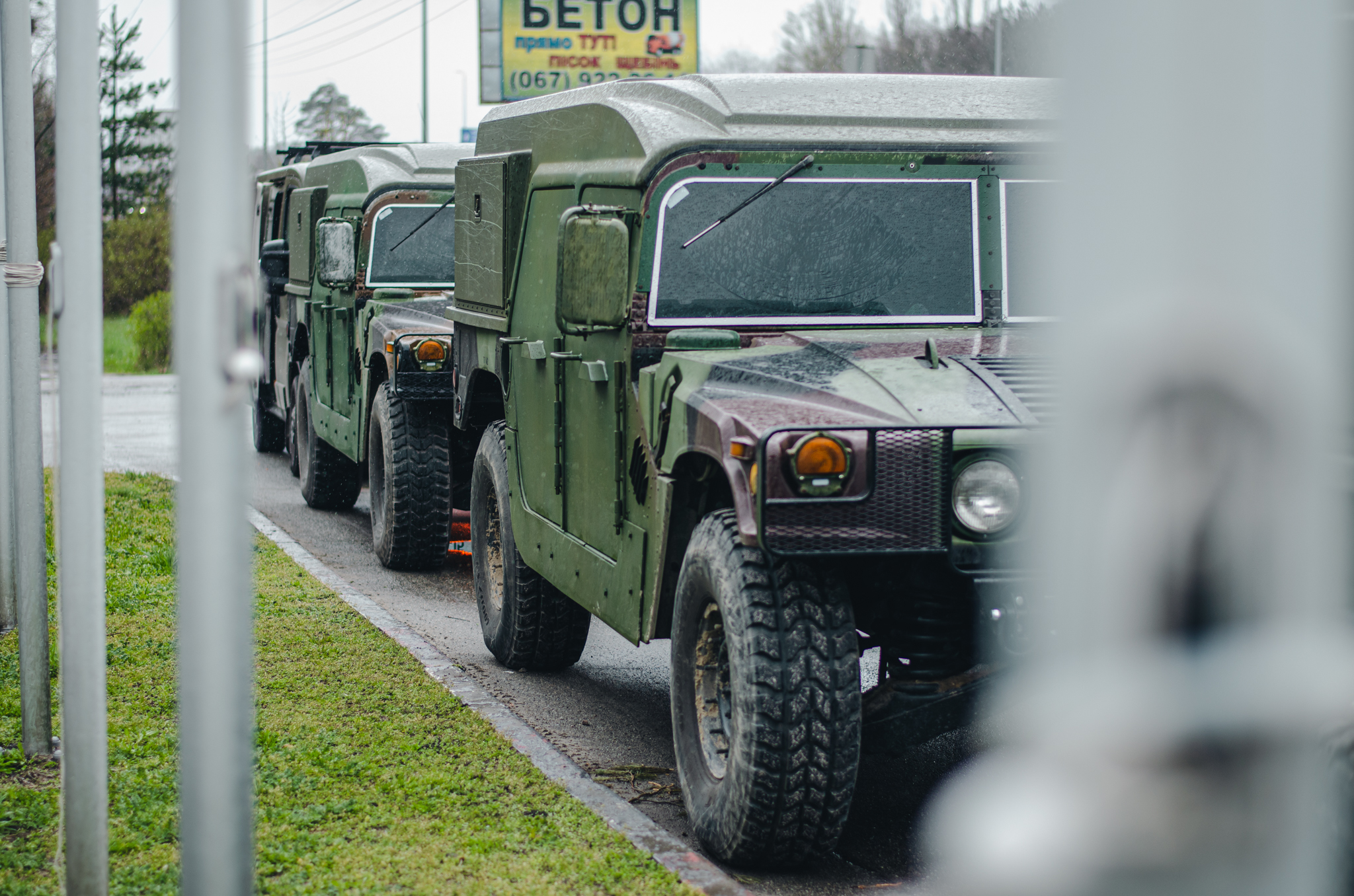
Notes Donetsk region
It's morning, it's already light outside, but our team is still recharging the batteries in their sleeping bags. That is, apart from Sully, he meets Czech Radio reporter Martin Dorazín in front of the school. After chatting for a while, they both head to the gym, where the rest of the team is sleeping and the wake-up call is in progress, they need to eat and continue with their assigned tasks. Although the sleep was short, it was of good quality compared to the last few days, so he wakes up relatively well. The school cooks even prepared a hot breakfast together with Lena and we got Easter gingerbread cookies. The ladies took very good care of us, but we have to go. We thank you for the overnight stay, care and we continue towards the front area, this time with Martin Dorazín.
Along the way, we stop at the daughter of a well-known paramedic from the area, the paramedic's name is Larisa, and unfortunately she was seriously injured during her work. While searching for wounded soldiers, she stepped on a Russian IED and lost several limbs, in addition to suffering brain damage. In the team, we internally made up our own money and handed over 50,000 to daughter Laris. Hryvnia to cover at least part of the costs of taking care of mom. It was an emotional meeting, if nothing else, the daughter and mother know that they are not alone and that other people are thinking of them. We get into our vans and head on.
Our three vans have another stop in Pokrovsk, specifically at Oleg's bakery, which Martin Dorazín knows well. This is a baker who carries not only bread, but also humanitarian aid to areas cut off from supply by the front, or where normal supply for civilians does not work very well. We put material help here mainly from people from the Lenka Novotná and Dáša Pecková project, plus we also added some boxes of help from us. These were mainly baby food, children's clothes, hygiene aids, trench candles for households without electricity, canned food and the like. This is also where the so-called "Safety brief" takes place for the following hours near the front, because the areas where we will be moving are regularly bombarded by both rockets and artillery, mortars, or dropping bombs from offal, depending on how far you are from the front. The team dons ballistic vests and helmets, which they will keep on until they return from the area for safety reasons.
We arrive in Druzhkivka, we know it here, we have already taken help here several times to the local clinic for wounded soldiers. However, due to the latest shelling, the paramedic unit moved to another part of the village, next to another hospital. Unfortunately, this is not very successful, as there is a huge hole in the ground in front of the warehouse and the base of the unit from the impact of the S-300 missile that landed here a few days ago. She missed the building itself with the paramedics by only a few meters. We meet up with an old friend of ours nicknamed "Vlas", the one we promised in December that his unit would receive from us the armored evacuation vehicles and other medical equipment that they so badly need. "Vlas" is happy to see us after months and that we really fulfilled what we promised. He shows us the material warehouse and his facilities, he also shows us the shrapnel-damaged but still functional SUV they are currently using to evacuate the wounded from Bachmut and the surrounding area. Absolute despair, we are very happy that they will have far better, more spacious and safer cars from people from the Czech Republic. We unload the material and try not to stand outside too much, even though "Vlas" tells us that it is under a cloud, so the Russian drones don't fly much. During the unloading, we show intraosseous drills and needles, which we also imported as part of the aid (in addition to many boxes of medical supplies and devices). It can be seen that "Vlas" has heard about them, but has not used them yet, because of this the summoned doctor of the unit knows the device well and is very happy with it. The unit doctor tells us about his experience with these devices and that he is now very happy to teach other paramedics how to use them now that they have them. The crew of Czech Television, which operates here in the east of Ukraine, came with us to film the handing over of things. David Miřejovský and Vojtech Hönig filmed a foam report with the paramedics.
We didn't like it, but we quickly had to say goodbye to the paramedics again and set off with more help, this time to the very end of the village of Kosťantynivky, where a unit of Ukrainian reconnaissance was waiting for us, who have their hideout here, if they are not operating on the Bakhmut Front. Our Bohdan knows these boys well from the summer when he brought them the necessary equipment as new recruits in the army. We are even more careful here, because the village is practically always more or less shelled. Although it is about 25 km away from Bachmut, the nearest Russian positions are currently about 5 km away from the end of the village, which is "a stone's throw away" in military terms. We are approaching the village and the dark sky is lit up by the flashes of bombing at Bachmut, sometimes there is an explosion 2-3 km away from the impact of a mortar or artillery shell. We drive quickly through the village and turn off the lights near the "Safe house" of the surveys, we park the vans about 50 m apart in busy streets so as not to create a "too interesting target". Everything now takes place only under the lights of dimmed red headlights. The explorers welcome us and invite us to the house, where we all get to know each other and Bohdan translates what the boys are saying. On the spot, we are still waiting for Pavel and his team, who had to stay at the office in Kremečuk and are taking the vehicle that we bought for them together with the Idealisti CZ/SK group here for surveys. In the meantime, we agree that before Pavel arrives with the Land Rover, we will put the rest of the equipment we found for them inside. For safety reasons, only a group of four people from the team go to collect the material, so that in the worst case, as few people as possible are injured, the others stay in the house with the explorers and drink tea. Carrying boxes of power banks, non-perishable food, drones and other equipment underlines the noise of explosions in various distant surroundings, together with the counterclaim of Ukrainian HIMARS, which, together with the flashes in the cloudy and dark sky, creates a special spectacle.
Once all the things for the explorations are brought in, the whole group sits down for tea and chats before Pavel and "Liška" (Pavel's sidekick) arrive. The boys tell us about their experiences from the front, unfortunately only 12 of the 20 people Bohdan knew were left alive, of which several others are wounded. Some units understand how to rest in the rear, but others seem (not only from the stories of these guys) not to be rotated much and are at the front continuously for over half a year or longer. Not everything can be told, but the stories about the human waves of the Wagner family, which echo in the trenches at Bachmut, standing on the bodies of their friends, together with the tired looks of the men, are a powerful experience. The phone rings, Pavel calls that he is coming. We open the gate and our dedicated Land Rover Discovery from around 2006 arrives, the boys will now at least have a better way to get to the front and back with material, unfortunately until now it sometimes happened that they had to walk from the village with the equipment to the front and then back again walk back, including ammunition supplies. We are showing the car in the monster near the house, when one of the explorers says "moped" and the guys get stuck, after a while they say that it is good, but we better go back to the house. Inside, we learn that the "moped" is what Iran's Shachet drones are called, which it quite possibly was, because a distant but powerful explosion can be heard from outside again. We talk together for about 20 minutes and the guys thank us for the help and support from the Czech Republic, but then we say goodbye. We don't want to spend the night there for security reasons, and we still have a full schedule to be back in the Czech Republic by Sunday midnight. We get into our vans and leave Kosťantynivka, driving just fast enough not to stay too long in the place, but also to be able to recognize the anti-tank mines on the road, which, according to local units, saboteurs place on the roads at night. Just a few days ago, the commander of one of the companies was killed in this way while he was driving to command at night. We get back to Pokrovsk via a potholed but significantly shorter road, where we take off our ballistic protection and have a coffee at a gas station. Here we also say goodbye to Martin Dorazín, who continues to Dnipro, but we go to Kremenchuk to the military hospital. Sleeping awaits us again nicely in the car during the change of drivers, but that is the fate of a volunteer.
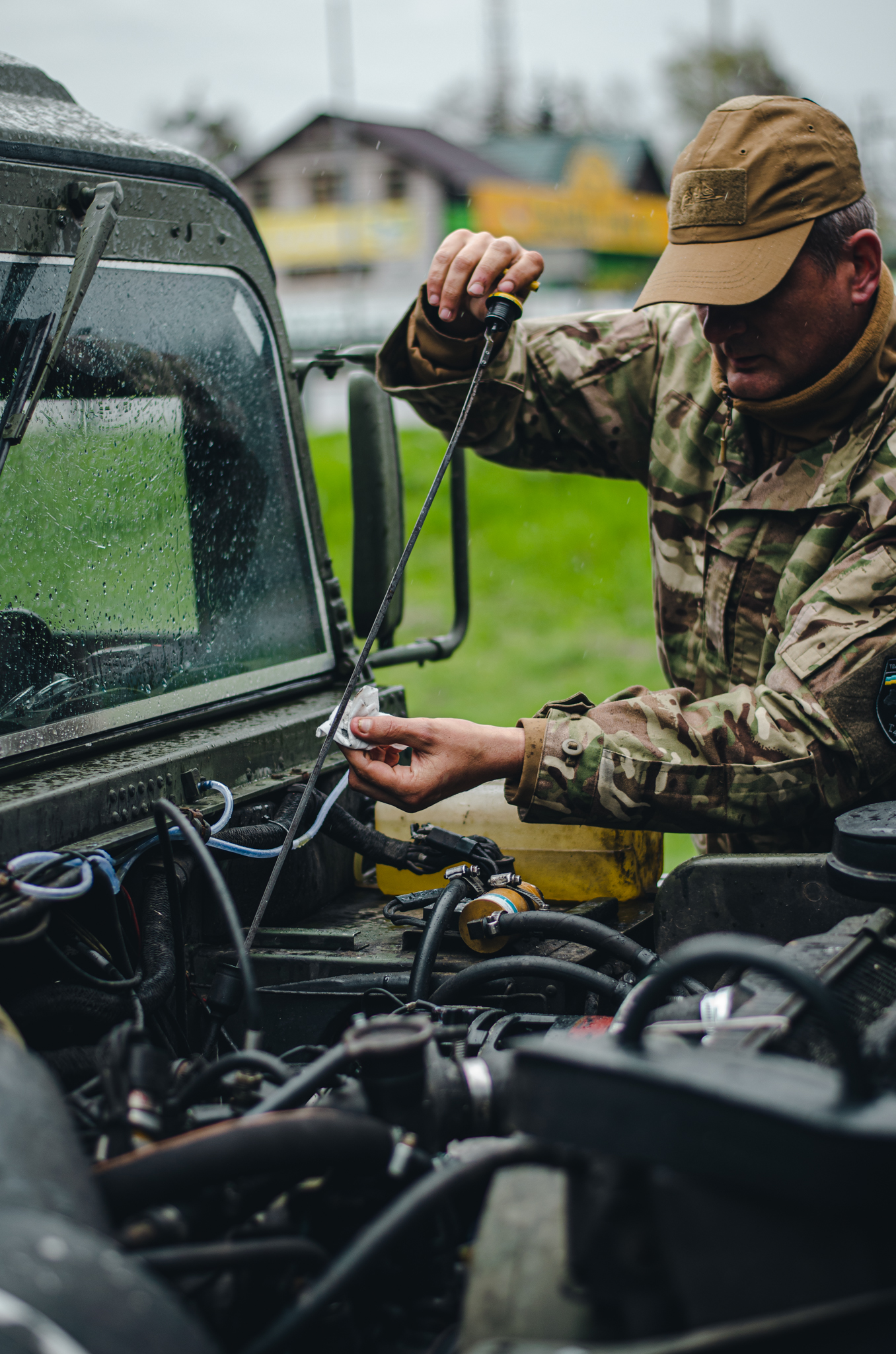
"Fallen Angel"
Sleep during the transfer is sometimes made very uncomfortable by potholed roads towards Kremenchuk, unfortunately the opposite extremes are frequent in Ukraine. One of them is the roads, in some places there are almost better sections of highways than in the Czech Republic, and in other places it is absolute hell with holes. If you drive the route you first drive, you never know what the road will be like. The importance or size of the road does not play a role at all. Sleeping is therefore a bit fragmentary even for a driver who is taking a break to sleep. Sometimes due to braking in front of a hole in hell, they even fly out of the seat, Rošťák could tell.
After moving 400 km from Pokrovsk to Kremečuk, we stop at a gas station for coffee, it is already morning and the city is bustling with activity. At the gas station, the local police are dealing with an incident with an extravagantly dressed lady, completely calm and trying to come up with a solution. Well, nothing, we finish our coffee and head to the hospital in Kremechuk, which is intended for the follow-up care and rehabilitation of wounded Ukrainian soldiers. Along the way, Pavel picks up his van full of material for this hospital, which was left for him in Kyiv by our first group, which could not go to Kremenchuk due to the time delay at the border. At the entrance to the hospital, we are greeted by the director named Mykola Litvinenko, an older man about 180 cm tall with deep wrinkles (his eyes have certainly seen a lot), but his smile and welcome are warm. It shows us where the hospital's storage buildings are, where we can drop off the material aid we've brought in, and from there it will be sorted into individual hospital departments as needed.
The whole team traditionally greets the director and the nurses from the hospital who came to help, so that we can then make a human chain and start unloading the aid. From small boxes with medicine, to large boxes with diapers, wheelchairs, packaging of aids, rehabilitation machines, crutches and more, we proceed with every delivery that had some material for the hospital. We are gradually filling the first and second storage rooms. When handing over things, we talk to each other and to the locals, there is a good mood. Once all the materials are in place, the nurses from the hospital come and bring the team brewed coffee for reinforcement. Bohdan translates our words of support and promise of long-term help to this hospital, the director thanks us with tears. He explains to us that the material brought is a great help for them, but perhaps even more it means for them that they are not alone in these horrors, that they are thinking about them abroad and are standing behind them.
In order to better target the help and support we will provide to this hospital, we asked the director if he would just give us a quick tour of the hospital. He is very happy to agree and we go through the individual floors and departments together with him. Primarily, soldiers with serious injuries, with loss of limbs, brain damage, complex injuries of the whole body, or those who have lost their sight appear here. They have many workplaces here for various healing or rehabilitation processes. Interesting places include the workplace of the simulated apartment, including the kitchen, where the injured learn to function independently in the home again despite the newly acquired handicap. The so-called palliative care department is sadder (Palliative care is comprehensive, active and quality-of-life-oriented care provided to a patient suffering from an incurable disease in an advanced or terminal stage.), but the director tells us that they also work with such patients on rehabilitation and try do what you can, until the very end. Mr. Litvinenko smiles slightly and says that sometimes a miracle happens and thanks to working with these patients, the condition will improve and they will eventually manage everything. We leave the hospital building and the director leads us to a nice garden where there is a small wooden cabin. From the outside of the cabin there is a beehive and inside the bed is placed directly above the hives. It is explained to us that it has beneficial and calming effects on the psyche of the patients. It is necessary to realize that wounded soldiers here suffer not only from physical trauma, but very often from some form of post-traumatic stress disorder. On the way back to the cars, we pass the hospital's back-up power station, which kept the facility running at a time when Russia was targeting the distribution network across the country. Next to the headquarters, there is also an entrance to the underground shelter and a parachute harness on a pulley, which, according to the director, is used to lower disabled patients into the shelter during the bombing of the city. Unfortunately, just a few days after our departure, the city was again bombarded by Russian rockets with casualties. We say goodbye because we still have a long way to go home and Monday's return to our jobs is fast approaching, but we are certainly not here for the last time.
On the way home, we drive through Kiev, where the last stop of our trip awaits us. We received a nice invitation to meet with our ambassador and his representative at the Czech Embassy in Kyiv, there was also something about Czech beer, so we couldn't not come. We received a warm welcome from both Mr. Ambassador Radek Matula and his representative Mr. Jiří Preclík. Those who were not supposed to drive in the following hours had a bottle of beer and the others coffee, we had a pleasant discussion about our activities in Ukraine and in general about the Czech Republic's support for Ukraine. Here again we have to thank the entire embassy for their support and advice in dealing with our delay at the border while transporting the Humvee. At the end, of course, we took a photo together and headed home poetically in the low light of the setting sun.
It was a challenging outing for us, but it again filled us with a sense of the good we had done and of useful help. Light will triumph over darkness!
Sully thanks the entire T4U team, without whom the whole event would not have been possible, thanks to: Rošťák, Red, Dráp, Jekub, Riggs, Igor, Tony, Mír, Hanz, Hooligan, Bárt, Adam, Šeďak, Bohdan, Pavlo, Liška, To Kalisťák, Tomáš, David, Long, Záloka, Madrid, Peter, Natta, Shalom, Marian, Aran, Mamut, Marko, Suchc and Ondra + PATH of the hope of life z.s. 🙂
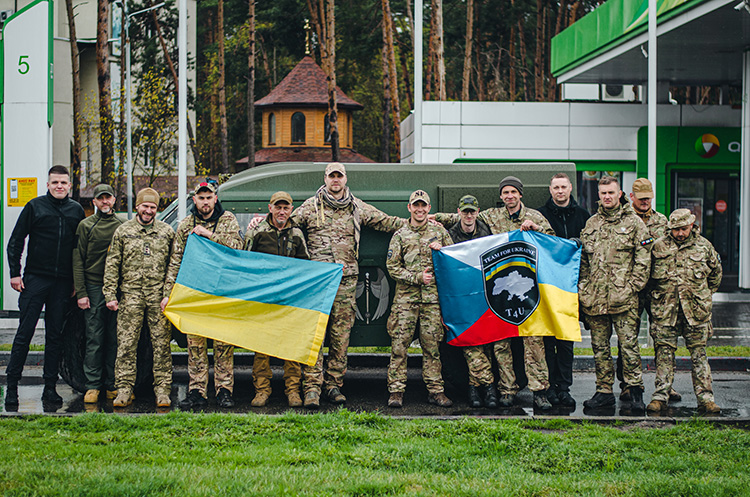
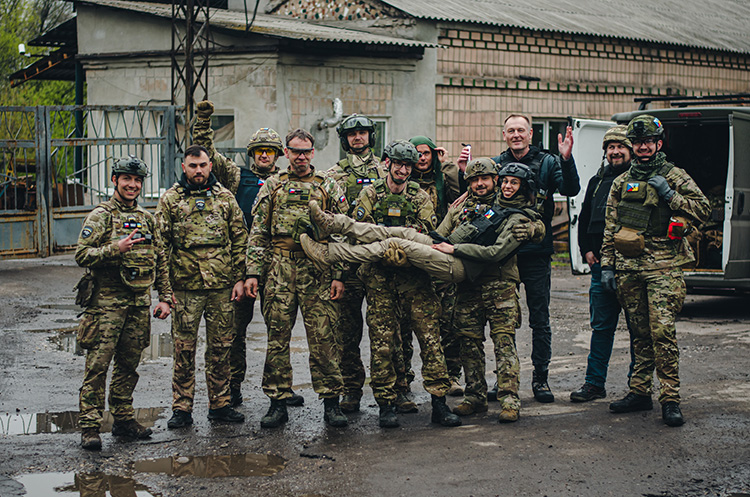
The entire T4U team especially thanks:
- Mrs. Rejlové for a literally Mega (CZK 1,000,000) contribution to the Humvee Rafael
- To contributors from the Donio.cz server
- Military Police of the Czech Army for the supply of warm tactical clothing for the ZSU
- Tond Frélich and his dad for supplying medical supplies
- Idealisti Cz/Sk for financial support for the purchase of a Land Rover for explorers
- PatentEnter for a contribution of CZK 100,000 for vehicle equipment
- To the company ROYAX, s.r.o. for medical retrofits to the Humvee at a discounted price and a generally friendly attitude
- To Pažout, who welded the balance platform for the hospital in Kremenchuk
- www.sportago.cz for a discount discount on RHB supplies to the hospital in Kremenčuk
- To Jakub Pokorný - proceeds from the jersey auction to buy medicine for the Kremenčuk hospital
- Hospice St. Jiří Cheba for delivering adult diapers and crutches to the hospital in Kremenčuk
- Association of war veterans of the Czech Republic "Veterans" for help with obtaining a large number of adult diapers for the hospital in Kremenčuk.
- Hance Nosková from YMCA Jindřichův Hradec for baby diapers and baby food for Oleg's humanitarian aid to civilians at the front
- BEXAMED.cz and paramedicshop for a discount and fast delivery of medical equipment and intraosseous drills for the military clinic in Druzhkivka
- Diaconia of the Church of the Brethren for procuring tourniquets for massive bleeding
- To the Ministry of Defense of the Czech Republic for long-term support led by Minister Jana Černochová
- To the Ministry of Foreign Affairs of the Czech Republic for long-term support
- To Senator Zdenek Hrab for his long-term support
- Gift for Putin for media support
- podcast "Brother" for media support
- Veronice Váchová from Jarotic et al. for children's things to the children's home in Vinica and adult clothes for Olegova
- Discord channel nean-Ukraine for a financial contribution of over 100,000. CZK
- To the company Adventure Menu for the box of meals that the ZSU explorers received on the Bachmut Front
In general, we would like to thank all donors, especially those who regularly Contribute to the Team 4 Ukraine account!
Text: Sully
Photo: Wynonaphotography, Kalisťák
Powered by Froala Editor
